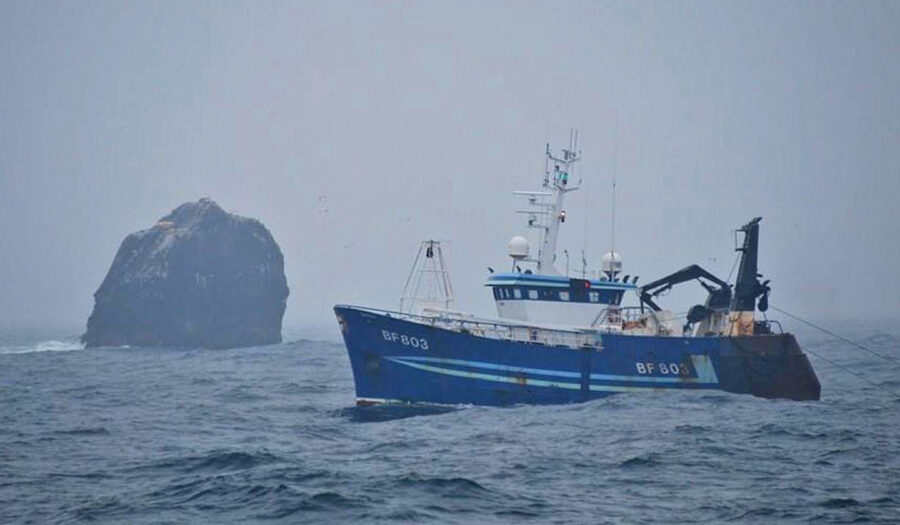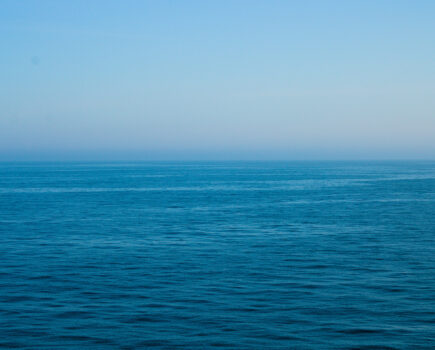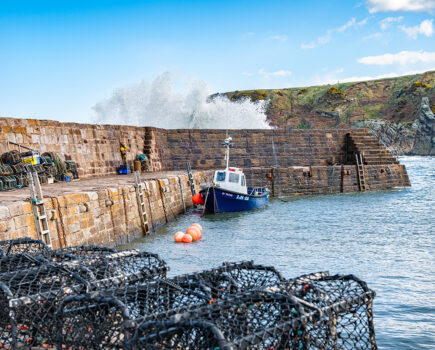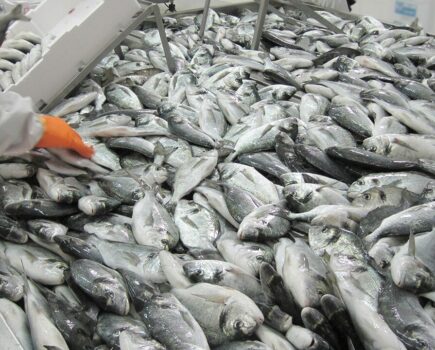Scotland claims sovereignty over Rockall waters
Irish vessels told they are fishing illegally
Scotland and Ireland are in conflict over fishing rights around Rockall, after the Scottish government said it would take enforcement action against Irish vessels fishing inside the 12-mile limit around the rock after 7 June, report Pauric Gallagher and Tim Oliver
Scottish cabinet secretary for external affairs Fiona Hyslop gave formal notice of the intended action in a letter to the Irish government.
Ireland’s Department of Agriculture, Food and the Marine (DAFM) held a meeting with the chief executives of Ireland’s four FPOs to inform them of the unfolding situation.
Jurisdiction over the 12-mile area around Rockall has long been disputed. The position of the Irish government is that the waters around Rockall form part of EU waters under the CFP, to which the principle of equal access for the vessels of all EU member states applies. The Scottish government raised the issue for the first time in 2017, following the Brexit referendum. It has emerged that the Scottish and Irish governments have held discussions about the situation for the past two years.
A Scottish government spokesperson said that Irish vessels, or any non-UK vessels, had never been allowed to fish in the UK’s territorial sea around Rockall. They said that despite undertaking ‘extensive discussions’ with the Irish authorities, it was ‘disappointing that this activity continues’.
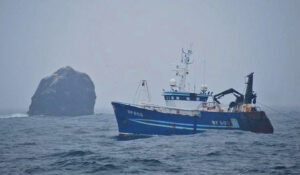
The Banff trawler Carina towing at Rockall. (Photo: Sean Glackin)
The spokesperson said there had been an increase in the ‘illegal activity’. Fiona Hyslop said, in a debate in the Scottish parliament, that activity by Irish vessels in the area had ‘increased sharply’, from 15 incursions in 2015 to 33 in 2016 and 94 in 2017.
In 2018, there was a slight decrease, due to a change in quotas and the absence of some seasonal fisheries. Surveillance by Marine Scotland had shown a decrease in Irish vessels’ activity in the area as a result of the notice of enforcement action.
She said that Scottish official and ministerial channels remained open throughout the period, and welcomed a move to intensify discussions.
The Scottish government spokesperson said that with the Rockall season about to begin, ‘it is our duty and obligation to defend the interests of Scottish fisheries, and ensure compliance with well-established international law’.
They hoped that the Irish government would warn their fishermen not to fish illegally in the area, but ‘should the illegal fishing continue, routine enforcement action will be implemented to protect our fisheries interests’.
The Scottish Fishermen’s Federation said it fully supported the Scottish government. Chief executive Bertie Armstrong said: “Irish vessels have no legal right to fish within 12 nautical miles. The area is recognised in UK law as part of Scottish territorial waters, and hosts multi-million-pound haddock, monkfish and squid fisheries that are hugely important to our fleet.
“The Scottish government is right to impose compliance, full stop. But at a time when we are moving towards independent coastal state status, it lays down a benchmark for the future.”
Ireland’s deputy prime minister (tánaiste) Simon Coveney and fisheries minister Michael Creed confirmed that discussions and exchanges had been held with the Scottish government over the past two years.
Ireland’s position is that there is no basis for excluding Irish fishing vessels from Rockall waters, as they were legitimately pursuing EU fishing opportunities in the area, and had been doing so unhindered for many decades.
Tánaiste Simon Coveney said: “The longstanding position of the Irish government is that Irish vessels are entitled to access to Rockall waters. We have never recognised UK sovereignty over Rockall, and accordingly, we have not recognised a territorial sea around it either.
“We have tried to work positively with the Scottish authorities, and to deal with sensitive issues that flow from it in a spirit of kinship and collaboration. We very much regret that matters have reached this point, and intend to do everything possible to achieve a satisfactory resolution.”
Minister Creed said that he and the tánaiste had worked ‘very closely’ to avoid a situation where Irish vessels were ‘under the unwarranted threat of ‘enforcement action’ by the Scottish government. However, ‘following this sustained unilateral action by them, I have no option but to put our fishing industry on notice of the stated intention of the Scottish government’.
Irish POs reject Scottish sovereignty claim
Irish POs firmly rejected Scotland’s claim to sovereignty over Rockall waters. After meeting the tánaiste and Minister Creed, Francis O’Donnell, chief executive of the Irish FPO, told Fishing News: “Irish vessels are entitled to fish right up to the rock at Rockall, and no one other than the UK recognises its claim of ownership of the rock.
“The Irish government has advised Irish fish producers and the Scottish government that it will take all necessary steps to protect Ireland’s fishing interests at Rockall. Irish vessels will continue as normal.
“It’s interesting that the UK is still part of the London Fisheries Convention – which Scotland has somehow forgotten about. This is as much an attempt by Scotland to stamp its authority in terms of its devolved government.
“When you consider that Ireland has just passed a fisheries bill that allows UK fishermen to fish inside our six-mile limit, and now there is an attempt to exclude Irish vessels from UK waters – so much for reciprocal access,” he concluded.
The Irish South and West FPO (IS&WFPO) called for the matter to be taken up by the EU, and for EU fisheries commissioner Karmenu Vella to intervene ‘before it escalates’.
Chief executive Patrick Murphy said that following the Brexit referendum, Scotland was trying to interpret the UN Law of the Sea (UNCLOS) on the basis that Rockall is an ‘island’. This would enable Scotland to claim sovereignty over all waters extending 200 miles westwards from Rockall, giving it maritime jurisdiction over waters some 350 miles west from the Scottish mainland.
He said: “The issue now is not whether Rockall is Irish or British, but whether Scotland, in anticipation of its leaving the UK and becoming an independent state, is entitled to assert a new and extended area of sovereign Scottish waters centred on Rockall, as if Rockall were an inhabited or habitable island like St Kilda, or one of the Hebrides, when Rockall is no more than a bare rock sticking up out of the ocean.”
He said that the Scottish government only raised the issue of access to the 12-mile area around Rockall for the first time in 2017, following the Brexit referendum.
He referred to the tánaiste’s statement of the Irish government’s longstanding position: that Irish vessels are entitled to access to Rockall waters, and that Ireland has never recognised UK sovereignty over Rockall, and therefore does not recognise a territorial sea around it either.
He said that Irish fishermen ‘do not accept this blatant and opportunistic attempted resource grab by our Scottish neighbours, which comes not only as a surprise to us in the industry, but also to our fellow Scottish fishermen’.
“We ask that this matter be put before the European Union, and ask for the EU commissioner Karmenu Vella to intervene in this matter before it escalates.”
He added that if ‘illegal action’ is carried out against Irish fishermen, ‘we expect more than words from our government’.
Legal experts: ‘Scotland right, Ireland wrong’
Two Irish international maritime law experts have said that Scotland is within its legal rights to place a 12-mile territorial limit around Rockall, reports Lorna Siggins.
Professor Clive Symmons, a maritime law expert at Trinity College Dublin, said that statements made by Irish government ministers over the past week have been ‘incorrect’, as Rockall is entitled to a 12-mile territorial sea.
Ireland also agreed to Rockall being included in Britain’s exclusive economic zone (EEZ) in March 2013.
Scotland is ‘within its rights’ to threaten enforcement, and Ireland ‘hasn’t a leg to stand on’ within Rockall’s 12-mile limit, Professor Symmons says.
Professor Ronán Long, who is the ocean governance and law of the sea chair at the World Maritime University, agrees with Professor Symmons. He says that rocks can generate 12-mile territorial sea limits under UN Law of the Sea convention rules.
But Ireland’s foreign affairs minister Simon Coveney and fisheries minister Michael Creed have both challenged Scotland’s right to enforce a 12-mile limit around Rockall.
Both ministers have pointed to Article 121 of the UN Convention on the Law of the Sea (UNCLOS), which states that ‘rocks which cannot sustain human habitation or economic life of their own shall have no EEZ or continental shelf’.
However, such rocks can still ‘generate territorial limits’, say the two professors.
Professor Symmons points out that Irish and other EU vessels have been inspected by British authorities off Rockall before, and there have been previous detentions.
Recorded detentions include Irish-registered vessels in 1987 and 1994, and a Cypriot-registered vessel with an Icelandic skipper, also in 1994.
Scottish Fisheries Protection Agency vessels have patrolled, inspected and boarded vessels in recent years, because Scotland is ‘administratively responsible’ for Rockall.
Marine Scotland said it could not give figures for the number of inspections of Irish vessels for ‘operational reasons’.
Professor Symmons, who is the author of Ireland and the Law of the Sea, published in 2000, says that Irish governments have spent half a century ‘acquiescing’ to various British claims to the rock, even if Ireland did not accept sovereignty.
“Sovereignty and a maritime zone are two separate issues here, and Ireland did not protest when a 12-mile limit was first placed around the rock in 1964,” Professor Symmons says.
The CFP applies outside 12-mile territorial limits, but vessels from certain other EU states with ‘traditional rights’ may be given access between six and 12 miles under the London Fisheries Convention. However, Britain plans to leave the London Fisheries Convention next month, and Rockall was never specified in it anyway, Professor Symmons said.
Once Brexit takes effect, Irish and EU vessels will no longer have any rights to fish in British waters, Professor Long points out.
The Irish Department of Foreign Affairs did not respond to a series of questions on the issue.
‘Serious answers required’ from Irish government on Rockall
Deputy Pat the Cope Gallagher has expressed shock at the failure of Irish prime minister Leo Varadkar to defend Ireland’s claim to Rockall, reports Pauric Gallagher.
Mr Gallagher said: “I was shocked yesterday in the course of the Dáil debates when An Taoiseach Leo Varadkar failed to defend Ireland’s claim to Rockall. Previously, all taoisigh defended an Irish claim to Rockall and to the waters surrounding Rockall, but yesterday that tradition was broken by Leo Varadkar in Dáil Eireann.
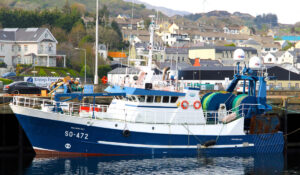
The Greencastle trawler Northern Celt is one of the Irish vessels currently fishing at Rockall.
“No previous Irish government ever ceded our claim to Rockall, nor did they ever recognise the claim made by the British to sovereignty over Rockall. It has always been an area of disagreement between the UK and Ireland – along with the sovereign states of Iceland and the Faroe Islands, in conjunction with Denmark, which also dispute the UK claim to Rockall.”
He added, “I am also raising the issue of the 2013 agreement reached between Ireland and the United Kingdom regarding the setting of the sea boundaries between the Irish exclusive economic zone and that of the UK.
“I am seeking clarity surrounding all possible implications of that agreement reached by the previous Fine Gael government in 2013. There is a possibility that there may be knock-on implications of that agreement from 2013 in the context of the current dispute, and that urgently needs to be clarified.
“We are in an extremely tense time regarding the future of our claim to Rockall and our access to the seas surrounding the rock. These fishing grounds have been fished by Irish fishermen for generations.
“The government needs to get much more proactive regarding this matter, and it is now apparent that in a post-Brexit scenario, the fisheries talks between the European Union and the United Kingdom are going to be tough, to say the least. Ireland will require a high degree of preparatory work in advance of these talks, which I believe we as a state are not giving sufficient priority to at present, and we need to maintain the direct link between trade talks and fishing access, otherwise we will lose out.”
Sinn Féin’s Senator Pádraig Mac Lochlainn has echoed these sentiments, saying that the Irish government now has serious questions to answer over Rockall and its defence of Irish fishing waters. He is demanding answers from the government on the role of its senior members in the 2013 agreement between the British and Irish governments, establishing a single maritime boundary between their exclusive economic zones and parts of their continental shelves.
As part of that agreement, regardless of whether Ireland recognises British sovereignty over the rock or not, Rockall falls within the 200-mile EEZ of the UK.
Senator Mac Lochlainn has also demanded that the government clarifies when the Scottish government commenced correspondence with them, threatening to enforce their 12-mile limit claim around Rockall, and if that correspondence continued during the progress of the recent sea fisheries (amendment) bill. He called for all of this correspondence, up to the present, to be published immediately.
Senator Mac Lochlainn said: “There are serious and growing questions for senior government figures over this latest Rockall controversy.
“The 2013 agreement was signed by then tánaiste (deputy prime minister) Eamonn Gilmore. Fishing industry representatives say the agreement, which effectively concedes Rockall to the UK, was made without any consultation – either with them or the wider public. Tánaiste Simon Coveney TD was minister for agriculture, food and the marine at the time.
“Fishing industry representatives also say that not only were they never consulted on the establishment of the boundaries, they were also subsequently not made aware of this. This is a serious situation, and the taoiseach and tánaiste need to clarify why and how this was allowed to happen.”
He added, “Further to this, fishing representatives have stated that they were not made aware of the exchange of correspondence between the Irish and Scottish governments over fishing rights around Rockall in recent times.
“They are flabbergasted that just a matter of months ago, the government signed into law another agreement which effectively allows UK-registered vessels to fish right up to the Irish coast, while they were in possession of this information.
“I am demanding that the government immediately publishes the full extent of this correspondence, and explains why it did not make the interested parties, including the fishermen and Oireachtas (parliament) members, aware of this when they pushed this controversial legislation through the houses earlier this year.”

